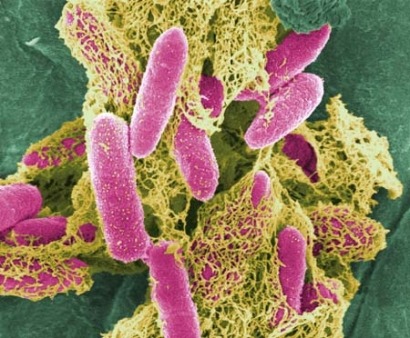
The advance is reported in this week’s issue of the journal Nature Chemical Biology by Michelle C. Y. Chang, assistant professor of chemistry at UC Berkeley, graduate student Brooks B. Bond-Watts and recent UC Berkeley graduate Robert J. Bellerose.
Various species of the Clostridium bacteria naturally produce a chemical called n-butanol (normal butanol) that has been proposed as a substitute for diesel oil and gasoline. While most researchers, including a few biofuel companies, have genetically altered Clostridium to boost its ability to produce n-butanol, others have plucked enzymes from the bacteria and inserted them into other microbes, such as yeast, to turn them into n-butanol factories. Yeast and E. coli, one of the main bacteria in the human gut, are considered to be easier to grow on an industrial scale.
While these techniques have produced promising genetically altered E. coli bacteria and yeast, n-butanol production has been limited to little more than half a gramme per litre, far below the amounts needed for affordable production.
Chang and her colleagues stuck the same enzyme pathway into E. coli, but replaced two of the five enzymes with look-alikes from other organisms that avoided one of the problems other researchers have had: n-butanol being converted back into its chemical precursors by the same enzymes that produce it.
The new genetically altered E. coli produced nearly five grams of n-butanol per liter, which is made at a lower level but at similar efficiency to the best genetically-altered Clostridium and about 10 times better than current industrial microbe systems like yeast and E. coli.
“We are in a host that is easier to work with, and we have a chance to make it even better,” Chang said. “We are reaching yields where, if we could make two to three times more, we could probably start to think about designing an industrial process around it.”
Among the reasons for engineering microbes to make fuels is to avoid the toxic by-products of conventional fossil fuel refining, and, ultimately, to replace fossil fuels with more environmentally friendly biofuels produced from plants. If microbes can be engineered to turn nearly every carbon atom they eat into recoverable fuel, they could help the world achieve a more carbon-neutral transportation fuel that would reduce the pollution now contributing to global climate change.
Chang is a member of UC Berkeley’s year-old Center for Green Chemistry and her work was supported by UC Berkeley, the Camille and Henry Dreyfus Foundation, the Arnold and Mabel Beckman Foundation and the Dow Sustainable Products and Solutions Program.
For additional information:

